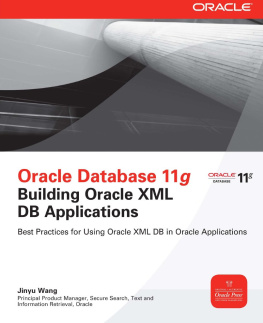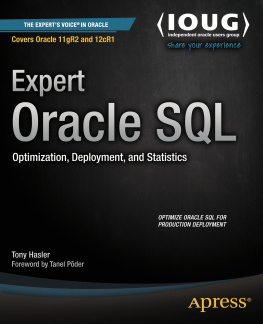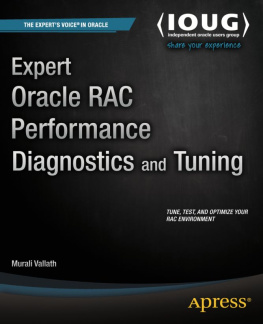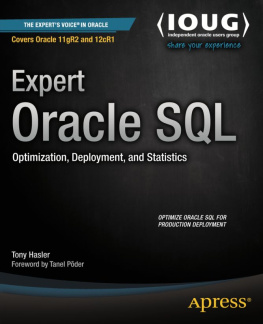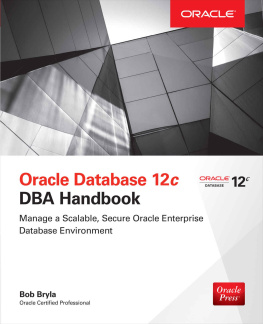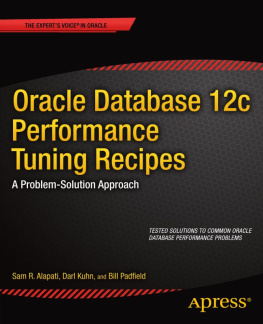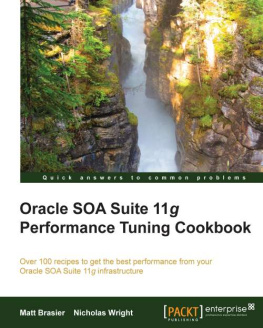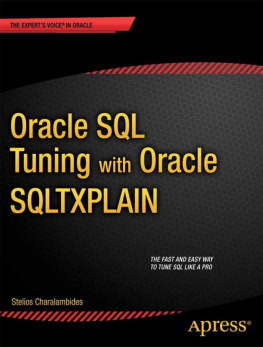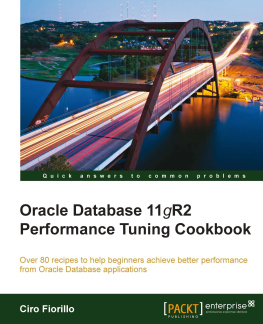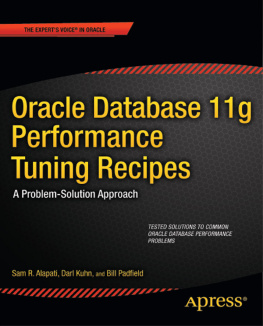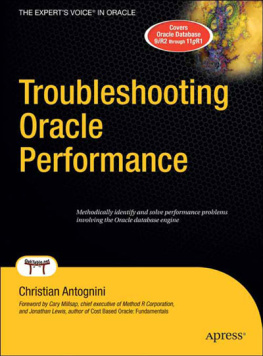About the Authors
Michael Rosenblum is a Software Architect/Senior DBA at Dulcian, Inc., where he is responsible for system tuning and application architecture. Michael supports Dulcian developers by writing complex PL/SQL routines and researching new features. He is the co-author of PL/SQL for Dummies (Wiley Press, 2006), contributing author of Expert PL/SQL Practices (Apress, 2011), and author of a number of database-related journal articles and conference papers. Michael is an Oracle ACE, a frequent presenter at various Oracle user group conferences (Oracle OpenWorld, ODTUG, IOUG Collaborate, RMOUG, NYOUG, etc.), and winner of the ODTUG Kaleidoscope 2009 Best Speaker Award. In his native Ukraine, he graduated summa cum laude from the Kiev National Economic University, where he received a Master of Science degree in Information Systems.
Dr. Paul Dorsey is the founder and president of Dulcian, Inc., an Oracle consulting firm specializing in business rules and web-based application development. He is the chief architect of Dulcians Business Rules Information Manager (BRIM) tool. Paul is the co-author of seven Oracle Press books on Designer, database design, Developer, and JDeveloper, which have been translated into nine languages, as well as the co-author of the Wiley Press book PL/SQL for Dummies. Paul is an Oracle ACE, and the first inductee into the IOUG SELECT Journal Hall of Fame. He is President Emeritus of NYOUG. Paul was honored in 2003 by ODTUG as volunteer of the year, in 2001 by IOUG as volunteer of the year, and by Oracle as one of the six initial honorary Oracle 9i Certified Masters. Pauls submission of a Survey Generator built to collect data for The Preeclampsia Foundation was the winner of the 2007 Oracle Fusion Middleware Developer Challenge, and Oracle selected him as the 2007 PL/SQL Developer of the Year.
About the Technical Editor
Arup Nanda has been working with Oracle Database and PL/SQL for the past 20 years (even when PL/SQL was available in SQL*Forms only and not in the database). He has written 500 articles, delivered about 300 sessions, co-authored five books, and delivered training sessions in 22 countries. Arup is an Oracle ACE Director, a member of the Oak Table Network, member of the Board of Directors of the Exadata SIG, and an editor for the SELECT Journal. Recognizing his expertise and contributions, Oracle awarded Arup the DBA of the Year in 2003 and Enterprise Architect of the Year in 2012. He lives in Danbury, Connecticut, and when not working, he loves to paint watercolors, shoot photographs, and read books.

Copyright 2014 by McGraw-Hill Education. All rights reserved. Except as permitted under the United States Copyright Act of 1976, no part of this publication may be reproduced or distributed in any form or by any means, or stored in a database or retrieval system, without the prior written permission of the publisher, with the exception that the program listings may be entered, stored, and executed in a computer system, but they may not be reproduced for publication.
ISBN: 978-0-07-182218-3
MHID: 0-07-182218-6
The material in this eBook also appears in the print version of this title: ISBN: 978-0-07-182482-8, MHID: 0-07-182482-0.
eBook conversion by codeMantra
Version 1.0
All trademarks are trademarks of their respective owners. Rather than put a trademark symbol after every occurrence of a trademarked name, we use names in an editorial fashion only, and to the benefit of the trademark owner, with no intention of infringement of the trademark. Where such designations appear in this book, they have been printed with initial caps.
McGraw-Hill Education eBooks are available at special quantity discounts to use as premiums and sales promotions, or for use in corporate training programs. To contact a representative please visit the Contact Us page at www.mhprofessional.com.
Oracle is a registered trademark of Oracle Corporation and/or its affiliates. All other trademarks are the property of their respective owners, and McGraw-Hill Education makes no claim of ownership by the mention of products that contain these marks.
Screen displays of copyrighted Oracle software programs have been reproduced herein with the permission of Oracle Corporation and/or its affiliates.
Information has been obtained by Publisher from sources believed to be reliable. However, because of the possibility of human or mechanical error by our sources, Publisher, or others, Publisher does not guarantee to the accuracy, adequacy, or completeness of any information included in this work and is not responsible for any errors or omissions or the results obtained from the use of such information.
Oracle Corporation does not make any representations or warranties as to the accuracy, adequacy, or completeness of any information contained in this Work, and is not responsible for any errors or omissions.
TERMS OF USE
This is a copyrighted work and McGraw-Hill Education and its licensors reserve all rights in and to the work. Use of this work is subject to these terms. Except as permitted under the Copyright Act of 1976 and the right to store and retrieve one copy of the work, you may not decompile, disassemble, reverse engineer, reproduce, modify, create derivative works based upon, transmit, distribute, disseminate, sell, publish or sublicense the work or any part of it without McGraw-Hill Educations prior consent. You may use the work for your own noncommercial and personal use; any other use of the work is strictly prohibited. Your right to use the work may be terminated if you fail to comply with these terms.
THE WORK IS PROVIDED AS IS. McGRAW-HILL EDUCATION AND ITS LICENSORS MAKE NO GUARANTEES OR WARRANTIES AS TO THE ACCURACY, ADEQUACY OR COMPLETENESS OF OR RESULTS TO BE OBTAINED FROM USING THE WORK, INCLUDING ANY INFORMATION THAT CAN BE ACCESSED THROUGH THE WORK VIA HYPERLINK OR OTHERWISE, AND EXPRESSLY DISCLAIM ANY WARRANTY, EXPRESS OR IMPLIED, INCLUDING BUT NOT LIMITED TO IMPLIED WARRANTIES OF MERCHANTABILITY OR FITNESS FOR A PARTICULAR PURPOSE. McGraw-Hill Education and its licensors do not warrant or guarantee that the functions contained in the work will meet your requirements or that its operation will be uninterrupted or error free. Neither McGraw-Hill Education nor its licensors shall be liable to you or anyone else for any inaccuracy, error or omission, regardless of cause, in the work or for any damages resulting therefrom. McGraw-Hill Education has no responsibility for the content of any information accessed through the work. Under no circumstances shall McGraw-Hill Education and/or its licensors be liable for any indirect, incidental, special, punitive, consequential or similar damages that result from the use of or inability to use the work, even if any of them has been advised of the possibility of such damages. This limitation of liability shall apply to any claim or cause whatsoever whether such claim or cause arises in contract, tort or otherwise.
Dedicated to my love, Elina, and my girls, Diana, Victoria, and Alisa, who taught me many new things about time optimization and resource management. They also finally showed me the real meaning of the idiom herding cats.
Michael Rosenblum, Verona, New Jersey, 2014
To the best part of my life, my family. Ileana, my wife, who helps me to be a better person and father. Her vision and dedication to all of her endeavors is an inspiration to me. To my son, Robert. I love to see him learn and grow. His wit, charm, and intelligence are a constant source of happiness for me.



